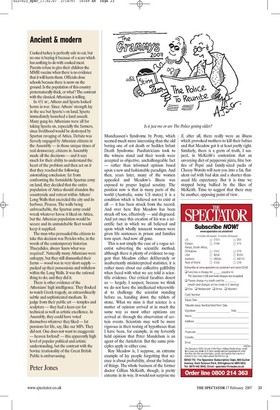Ancient & modern
Cooked turkey is perfectly safe to eat, but no one is buying it because of a scare which has nothing to do with cooked meat Parents refuse to give their children the M MR vaccine when there is no evidence that it will harm them. Officials close schools because there is snow on the ground. Is the population of this country preternaturally thick, or what? The contrast with the classical Athenians is telling.
In 431 BC, Athens and Sparta locked horns in war. Since Athens' strength lay in the sea but Sparta's on land, Sparta immediately launched a land assault. Many gung-ho Athenians were all for taking Sparta on, especially the farmers, since livelihood would be destroyed by Spartan ravaging of Attica. Debate was fiercely engaged by Athenian citizens in the Assembly — in those unique times of real democracy, citizens in Assembly made all the decisions — and it says much for their ability to understand the heart of the problem and then act on it that they reached the following astonishing conclusion: far from confronting the formidable Spartan army on land, they decided that the entire population of Attica should abandon the countryside and retreat within Athens' Long Walls that encircled the city and its harbour, Piraeus. The walls being unbreachable, the Spartan army could wreak whatever havoc it liked on Attica, but the Athenian population would be secure and its unmatchable fleet would keep it supplied.
The man who persuaded the citizens to take this decision was Pericles who, in the words of the contemporary historian Thucydides, always 'knew what was required'. Naturally many Athenians were unhappy, but they still dismantled their farms — wood was in very short supply — packed up their possessions and withdrew within the Long Walls. It was the rational thing to do; and they did it.
There is other evidence of the Athenians' high intelligence. They flocked to watch Greek tragedy, an extraordinarily subtle and sophisticated medium. To judge from their public art — temples and sculpture — they had a keen eye for technical as well as artistic excellence. In Assembly, they could have voted themselves whatever they liked — fat pensions for life, say, like our MPs. They did not. One does not want to exaggerate — heaven forfend! — this apparently high level of popular political and artistic understanding, but the contrast with the bovine irrationality of the Great British Public is embarrassing.
Peter Jones

























































 Previous page
Previous page